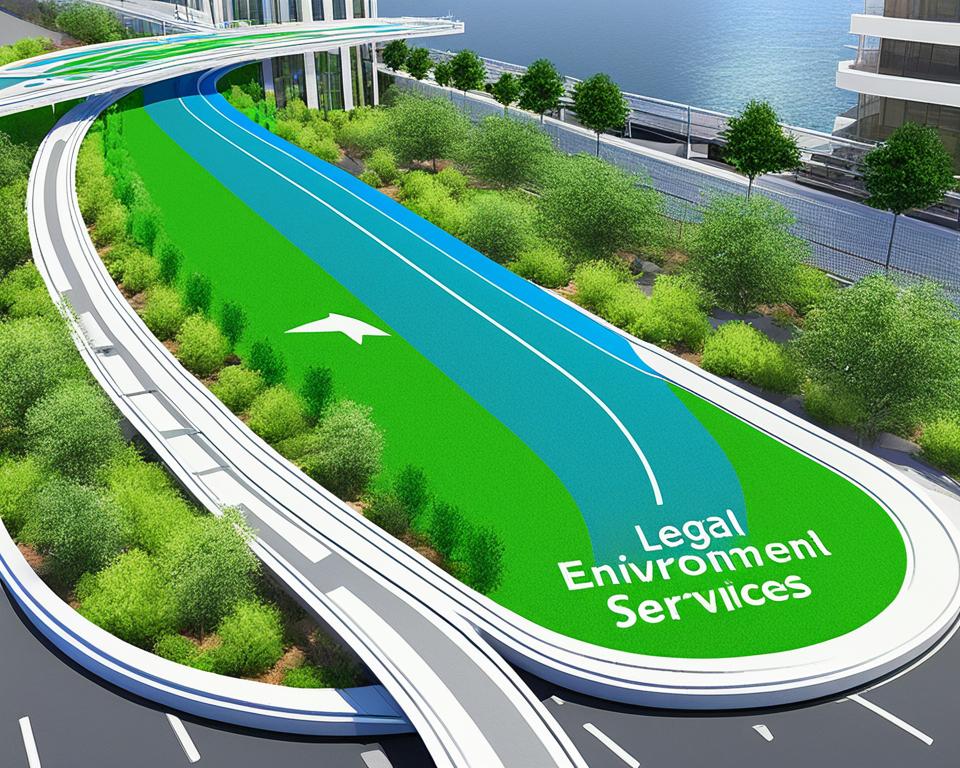Law & Insurance
Legal Innovations for Sustainable Transportation Systems
The transportation sector plays a vital role in our daily lives, connecting people and goods across cities and countries. However, it also contributes significantly to environmental issues such as air pollution and greenhouse gas emissions. To address these challenges, legal innovations have emerged as essential tools in promoting sustainable transportation systems.
Legal solutions can help shape transportation policies, support environmental compliance, and drive the adoption of eco-friendly practices in the industry. From promoting the use of alternative fuels to advocating for energy-efficient vehicles and sustainable infrastructure, legal interventions are playing a crucial role in reducing the environmental footprint of the transportation sector.
This article will explore the various aspects of legal innovations related to sustainable transportation systems. We will examine the impact of environmental law on transportation policies, discuss the role of environment law firms in shaping regulations, and provide case studies showcasing successful legal interventions in the transportation sector. Additionally, we will explore the integration of environmental legal services in transportation planning, highlight legal solutions for addressing environmental issues in urban transport systems, and discuss the concept of adaptive transportation laws for reducing environmental footprints.
Furthermore, we will delve into eco-friendly legal services and green compliance solutions in the transportation sector, emphasizing the importance of sustainable business practices for transit companies and the implementation of green law solutions in transportation enterprises. We will also explore the strategic environmental policy advocacy by legal professionals and the role they play in shaping environmental policies and regulations. Lastly, we will discuss sustainability legal advice for innovative mobility services, environmental compliance services for transportation technologies, and conclude by summarizing the key points discussed throughout the article.
Join me as we delve into the world of legal innovations for sustainable transportation systems and explore how they are transforming the industry to create a more environmentally friendly and sustainable future.
Key Takeaways:
- Legal innovations are essential for promoting sustainable transportation systems.
- Environmental law plays a crucial role in shaping transportation policies.
- Environment law firms have a significant impact on regulatory frameworks.
- Legal interventions can lead to positive outcomes in the transportation sector.
- Integration of environmental legal services is crucial in transportation planning.
Understanding the Impact of Environmental Law on Transportation Policies
This section delves into the significant role that environmental law plays in shaping transportation policies, with a focus on sustainable practices. By implementing legal frameworks that prioritize environmental protection, transportation systems can contribute to a more sustainable and greener future.
Role of Environment Law Firms in Shaping Regulation
Environment law firms play a crucial role in shaping transportation regulations and policies. These firms specialize in providing legal counsel and expertise in matters related to environmental law and sustainability. They work closely with government agencies, transportation companies, and other stakeholders to ensure that regulations align with environmental goals and address the unique challenges of the transportation sector.
Case Studies: Legal Interventions and Transportation Outcomes
Case studies provide compelling examples of how legal interventions have contributed to positive outcomes in the transportation sector. These examples showcase the effectiveness of legal solutions in addressing environmental issues and promoting sustainable transportation practices. By analyzing real-world scenarios, we can gain valuable insights into the impact of legal initiatives and understand how they can be replicated to achieve similar outcomes.
Case Study 1: Legal Intervention Improving Air Quality
In a landmark legal case, a law firm successfully challenged a transportation company’s non-compliance with emissions standards. As a result, the company was compelled to implement measures to reduce harmful emissions from their vehicles, ultimately leading to a significant improvement in local air quality.
Case Study 2: Legal Action Promoting Sustainable Practices
A legal intervention against a city’s transportation policies resulted in the adoption of sustainable practices, such as the introduction of dedicated bike lanes and improved public transit infrastructure. These changes not only reduced traffic congestion but also encouraged more environmentally-friendly modes of transportation.
Summary Table: Impact of Environmental Law on Transportation Policies
| Environmental Law | Role in Transportation Policies |
|---|---|
| Compliance with Emissions Standards | Reduces harmful emissions and improves air quality. |
| Sustainable Infrastructure Development | Promotes the use of eco-friendly transportation modes. |
| Legal Interventions | Addresses environmental challenges and drives positive outcomes. |
This table provides a summary of the key impacts of environmental law on transportation policies. It highlights the role of compliance with emissions standards, sustainable infrastructure development, and legal interventions in achieving sustainable transportation practices.
Integration of Environmental Legal Services in Transportation Planning
In order to promote sustainable transportation systems, it is crucial to consider the integration of environmental legal services in the planning and development of transportation infrastructure. Environmental legal services play a vital role in ensuring that transportation planning processes align with sustainability goals and address environmental concerns. By incorporating legal considerations into transportation planning, we can create a framework that not only supports the efficient movement of people and goods but also prioritizes environmental protection.
One key consideration in the integration of environmental legal services is the assessment of potential environmental impacts. This involves conducting thorough environmental impact assessments to identify and mitigate any potential harm to the environment caused by transportation projects. By addressing these impacts early in the planning stages, we can minimize negative environmental consequences and pave the way for greener and more sustainable transportation systems.
Another important aspect of integrating environmental legal services is the incorporation of environmental regulations and standards into transportation planning processes. This includes compliance with laws regarding air quality, noise pollution, carbon emissions, and other environmental factors. By adhering to these regulations, transportation planners can ensure that their projects meet environmental requirements and contribute to overall sustainability.
Challenges may arise in the integration of environmental legal services into transportation planning. These challenges include navigating complex regulatory frameworks, identifying potential conflicts between environmental goals and other planning considerations, and managing stakeholder expectations. However, by working closely with environmental law firms and legal experts specializing in transportation planning, these challenges can be overcome, ensuring that legal requirements are met while promoting sustainable transportation solutions.
Overall, the integration of environmental legal services in transportation planning is essential for fostering sustainable transportation systems. By considering legal aspects related to sustainability, conducting environmental impact assessments, and adhering to environmental regulations, we can create transportation infrastructure that is environmentally responsible and supports the needs of communities. With the expertise of environmental law firms and the commitment to sustainability, we can pave the way for a greener future in the transportation sector.

Legal Solutions for Environmental Issues in Urban Transport Systems
In urban areas, environmental issues such as air pollution and traffic congestion pose significant challenges for sustainable transportation systems. To address these issues, legal solutions play a crucial role in mitigating environmental harm and promoting a cleaner, more efficient urban transport system. In this section, we will explore two key aspects of legal support in urban transportation: environmental litigation for public transit disputes and climate change litigation support in relation to traffic emissions regulations.
Environmental Litigation Support for Public Transit Disputes
In urban transport systems, public transit disputes often arise due to various environmental concerns, including noise pollution, inadequate infrastructure, and adverse effects on local ecosystems. The resolution of these disputes requires legal support to ensure that environmental considerations are appropriately addressed.
Environmental litigation support involves legal professionals advocating for the implementation of sustainable practices in public transit operations. This can include filing lawsuits against transit agencies or advocating for policy changes that prioritize environmental protection. Through legal interventions, public transit disputes can be resolved in a manner that considers the ecological impact and supports the development of cleaner and more sustainable transportation systems.
Climate Change Litigation Support and Traffic Emission Regulations
Climate change litigation plays a crucial role in addressing the impact of traffic emissions on the environment. Legal frameworks and regulations are increasingly focusing on reducing greenhouse gas emissions from the transport sector to combat climate change. Through climate change litigation support, legal professionals assist in enforcing and advocating for traffic emission regulations to ensure compliance with environmental standards.
These regulations aim to promote the use of cleaner fuels, energy-efficient vehicles, and the development of sustainable infrastructure. Legal interventions support the implementation of emission control measures, empower communities to hold polluters accountable, and drive the transition to a low-carbon urban transport system.
By harnessing legal solutions, urban transport systems can effectively address environmental issues, reduce their carbon footprint, and enhance overall sustainability. The combination of environmental litigation support for public transit disputes and climate change litigation support in traffic emission regulations establishes the legal foundation necessary for a greener and more resilient urban transportation network.
Adaptive Transportation Laws for Reduced Environmental Footprint
In order to address the environmental challenges of the transportation sector, adaptive transportation laws play a crucial role in promoting sustainable practices and reducing the overall environmental footprint. These laws and regulations are designed to encourage innovative approaches that prioritize the use of alternative fuels, energy-efficient vehicles, and sustainable infrastructure.
By implementing adaptive transportation laws, governments can create a legal framework that supports the adoption of environmentally friendly practices. This includes incentivizing the use of electric vehicles, promoting public transportation systems, and integrating sustainable modes of transportation into urban planning. These laws not only contribute to the reduction of greenhouse gas emissions but also enhance the overall efficiency and resilience of transportation systems.
Adaptive transportation laws are instrumental in creating a more sustainable future by enabling the transportation sector to align with global environmental goals and reduce its impact on the planet.
However, implementing adaptive transportation laws is not without challenges. One of the main obstacles is the need for collaboration between various stakeholders including government agencies, transportation companies, and environmental groups. The complexity of legal frameworks, policy development, and enforcement mechanisms requires a coordinated effort to ensure successful implementation.
Despite these challenges, adaptive transportation laws present numerous opportunities for innovation and progress. By embracing sustainability-focused transportation solutions, cities and countries can not only mitigate environmental damage but also enhance public health, improve mobility options, and reduce dependence on fossil fuels.
Moreover, adaptive transportation laws can drive economic growth by fostering the development of new industries and businesses that cater to sustainable transportation needs. This includes the manufacturing of electric vehicles, the establishment of charging infrastructure, and the integration of smart transportation technologies.
Overall, adaptive transportation laws are vital in achieving a reduced environmental footprint in the transportation sector. By implementing innovative legal solutions, governments can shape the future of transportation and create a more sustainable and resilient world.

Eco-Friendly Legal Services and Green Compliance Solutions
In today’s age of increasing environmental awareness and responsibility, transit companies and transportation enterprises are seeking eco-friendly legal services and green compliance solutions to reduce their environmental impact and promote sustainable business practices. By implementing green law solutions and adopting sustainable practices, these companies can contribute to a greener future while also complying with environmental regulations.
Sustainable Business Practices for Transit Companies
Transit companies can play a significant role in reducing their carbon footprint and promoting sustainable transportation. By implementing sustainable business practices, such as investing in energy-efficient vehicles, adopting alternative fuels, and incorporating green infrastructure, transit companies can minimize their environmental impact. These practices not only contribute to a cleaner environment but also enhance operational efficiency and cost-effectiveness.
Sustainable business practices for transit companies may include:
- Transitioning to electric or hybrid vehicles to reduce greenhouse gas emissions
- Implementing energy-efficient technologies to optimize fuel consumption
- Using renewable energy sources to power transportation facilities
- Optimizing routes and schedules to reduce fuel consumption and improve efficiency
- Promoting active transportation options, such as cycling and walking
By adopting these sustainable practices, transit companies can lead the way in creating a more eco-friendly transportation system that benefits both the environment and the communities they serve.
Implementing Green Law Solutions for Transportation Enterprises
Transportation enterprises face a range of legal challenges, from regulatory compliance to mitigating environmental risks. To address these challenges and promote sustainable practices, it is essential to implement green law solutions.
Green law solutions encompass a variety of legal strategies and compliance measures designed to minimize environmental impact and promote sustainability. These solutions may include:
- Ensuring compliance with environmental regulations and permits
- Developing sustainable procurement practices
- Implementing waste reduction and recycling programs
- Supporting renewable energy initiatives
- Promoting environmental education and awareness
By integrating green law solutions into their operations, transportation enterprises can reduce their environmental footprint and contribute to the overall sustainability of the industry.
Eco-Friendly Legal Services and Green Compliance Solutions
| Eco-Friendly Legal Services | Green Compliance Solutions |
|---|---|
| Legal guidance on environmental regulations | Ensuring compliance with environmental permits and licenses |
| Developing sustainability policies and strategies | Implementing sustainable procurement practices |
| Environmental impact assessments | Waste reduction and recycling programs |
| Advising on renewable energy initiatives | Promoting environmental education and awareness |
By embracing eco-friendly legal services and implementing green compliance solutions, transit companies and transportation enterprises can pave the way for a more sustainable and environmentally conscious industry. These initiatives not only benefit the environment but also contribute to the long-term success and resilience of the companies involved.
Strategic Environmental Policy Advocacy by Legal Professionals
In today’s rapidly changing world, environmental policy advocacy plays a crucial role in shaping sustainable transportation systems. Legal professionals have the unique opportunity to influence and drive environmental policies and regulations through strategic advocacy and lobbying efforts. By leveraging their expertise and knowledge of environmental law, they can actively contribute to the development and implementation of policies that promote sustainability and address environmental challenges in the transportation sector.
Legal professionals possess the necessary skills to navigate complex legal frameworks and understand the intricacies of environmental policy-making. They can provide valuable insights and analysis to policymakers, helping them make informed decisions that prioritize environmental preservation and sustainable practices. Through persuasive advocacy, legal professionals can effectively communicate the importance of sustainable transportation and the need for supportive policies to address climate change, reduce emissions, and protect ecosystems.
However, strategic environmental policy advocacy is not without its challenges. Legal professionals often face resistance from various stakeholders who prioritize economic and political interests over sustainable practices. Overcoming these challenges requires a comprehensive understanding of the political landscape, strong communication skills, and the ability to build coalitions and alliances with like-minded organizations and individuals.
Legal professionals must also stay updated with the latest developments in environmental science and technology, enabling them to provide accurate and effective advocacy. By combining scientific evidence with legal expertise, they can present compelling arguments in support of sustainable transportation and environmental protection. Additionally, legal professionals can work collaboratively with environmental organizations, industry experts, and government agencies to influence policy outcomes and promote positive change.
Strategic environmental policy advocacy by legal professionals is an essential component in achieving sustainable transportation systems. Their efforts can influence the development of regulations and policies that prioritize environmental protection, foster innovation, and reduce the carbon footprint of transportation. By actively engaging in policy advocacy, legal professionals can shape the future of transportation, paving the way for a greener and more sustainable future.
Sustainability Legal Advice for Innovative Mobility Services
In today’s rapidly evolving transportation landscape, innovative mobility services play a significant role in shaping sustainable transportation systems. As the demand for efficient and eco-friendly transportation solutions continues to grow, it becomes crucial to ensure that these services comply with necessary legal and regulatory frameworks. Sustainability legal advice becomes essential in navigating the complex landscape of ride-sharing regulations and the development of electric vehicle infrastructure. Environmental legal counsel and evolving legal frameworks are instrumental in promoting sustainable mobility solutions.
Environmental Legal Counsel Role in Ride-Sharing Regulations
Environmental legal counsel holds a critical role in shaping ride-sharing regulations to promote sustainability. These legal professionals focus on addressing key environmental concerns in the ride-sharing industry, such as reducing greenhouse gas emissions and promoting energy-efficient practices. By working closely with policymakers, transportation companies, and environmental organizations, environmental legal counsel can advocate for regulations that prioritize sustainability and strike a balance between innovation and environmental responsibility.
These legal experts provide guidance on issues such as:
- Ensuring compliance with environmental regulations and emission standards
- Developing policies that promote the use of eco-friendly vehicles
- Implementing strategies to reduce congestion and optimize transportation routes
- Addressing the impact of ride-sharing on local communities and urban environments
“Environmental legal counsel plays a critical role in ensuring that ride-sharing services align with sustainability goals and environmental regulations”
By offering sustainability legal advice, environmental legal counsel helps ride-sharing platforms integrate environmentally conscious practices into their operations. These legal professionals are well-versed in the evolving legal landscape and can guide companies in navigating the complexities of environmental law and regulations.
Evolving Legal Frameworks Addressing Electric Vehicle Infrastructure
The development of electric vehicle infrastructure is a key component of sustainable mobility services. As the demand for electric vehicles continues to rise, it becomes imperative to have legal frameworks in place to support the widespread adoption of these vehicles. Evolving legal frameworks play a crucial role in addressing the challenges and opportunities associated with electric vehicle infrastructure.
These legal frameworks focus on:
- Establishing charging infrastructure standards and accessibility
- Ensuring equitable access to electric vehicle charging stations
- Implementing incentives and regulations to promote electric vehicle adoption
- Addressing the environmental impact of battery production and disposal
Through comprehensive legal frameworks, governments and regulatory bodies can encourage the development of electric vehicle infrastructure, making it more accessible and convenient for consumers. By proactively addressing legal considerations and challenges, these frameworks create an enabling environment for sustainable mobility solutions.

| Benefits of Evolving Legal Frameworks for Electric Vehicle Infrastructure | Challenges Faced in Implementing Legal Frameworks |
|---|---|
|
|
The table above illustrates the benefits and challenges associated with evolving legal frameworks for electric vehicle infrastructure. These frameworks lay the foundation for a sustainable future, but they require careful navigation and collaboration between stakeholders to overcome the challenges and unlock the full potential of electric mobility.
To build a sustainable transportation ecosystem, it is vital to integrate sustainability legal advice from environmental legal counsel and leverage evolving legal frameworks. By addressing the legal considerations and challenges, innovative mobility services can contribute to a greener, more efficient, and environmentally responsible transportation system.
Environmental Compliance Services for Transportation Technologies
In order to promote sustainable transportation systems and minimize the environmental impact of transportation technologies, it is crucial to ensure compliance with environmental regulations. Environmental compliance services play a vital role in guiding transportation companies and organizations towards adopting sustainable practices and meeting compliance requirements.
Legal Guidance on Emission Control Technologies
“Implementing effective emission control technologies is essential for reducing pollution and protecting the environment. However, navigating the complex legal frameworks surrounding these technologies can be challenging. That’s where legal guidance comes in. Knowledgeable legal professionals provide expertise and advice on the applicable regulations and best practices, helping transportation companies choose and implement the most appropriate emission control technologies.”
Legal guidance on emission control technologies involves understanding and interpreting the relevant laws and regulations, such as emission standards and testing requirements. It also includes assistance in obtaining permits and approvals for the deployment of emission control technologies. With the support of legal professionals, transportation companies can ensure compliance with the law and contribute to a cleaner and healthier environment.
Comprehensive Environmental Compliance Audits and Reporting

Environmental compliance audits are essential for evaluating the environmental performance of transportation technologies and identifying areas for improvement. These audits involve comprehensive assessments of various factors, including emissions, waste management, and adherence to environmental regulations.
“Through rigorous environmental compliance audits, transportation companies can proactively identify potential compliance issues and take corrective actions to mitigate environmental risks. This supports their commitment to sustainability and helps build trust with stakeholders and regulatory authorities.”
In addition to audits, reporting mechanisms are crucial for tracking and documenting environmental compliance efforts. Transportation companies must provide accurate and transparent reports on their environmental performance, enabling authorities and the public to evaluate their compliance with regulations and sustainability goals.
Comprehensive environmental compliance audits and reporting provide valuable insights into the environmental impact of transportation technologies and foster continuous improvement towards sustainable practices.
Conclusion
In conclusion, the integration of legal innovations is vital for promoting sustainable transportation systems and achieving our environmental goals. Throughout this article, we have explored the impact of environmental law on transportation policies, highlighting the important role of environment law firms in shaping regulations and the positive outcomes of legal interventions in the transportation sector.
We have also discussed the significance of incorporating environmental legal services in transportation planning and the legal solutions available for addressing environmental issues in urban transport systems. Adaptive transportation laws have been identified as key tools for reducing environmental footprints, while eco-friendly legal services and green compliance solutions can drive sustainable practices in the industry.
Moreover, we have emphasized the strategic role of legal professionals in environmental policy advocacy, as well as the necessity of providing sustainability legal advice for innovative mobility services. Lastly, the importance of environmental compliance services for transportation technologies has been highlighted, ensuring the adherence to environmental regulations and the promotion of emission control technologies.
In the pursuit of sustainable transportation, I encourage further research and implementation of legal solutions to address environmental challenges in the transportation sector. By harnessing the power of legal innovation, we can pave the way towards a greener and more sustainable future.
FAQ
What are some legal innovations for sustainable transportation systems?
How does environmental law impact transportation policies?
What is the role of environment law firms in shaping transportation regulations?
Can you provide examples of legal interventions that have led to positive outcomes in the transportation sector?
How can environmental legal services be integrated into transportation planning?
What are the key considerations and challenges in incorporating environmental legal services into transportation planning processes?
How do legal solutions address environmental issues in urban transport systems?
What are adaptive transportation laws and how do they reduce environmental footprints?
What are eco-friendly legal services and how do they promote sustainable practices in the transportation industry?
How can legal professionals contribute to strategic environmental policy advocacy?
What is the role of environmental legal counsel in shaping ride-sharing regulations?
How do legal frameworks address the development of electric vehicle infrastructure?
Why is legal guidance on emission control technologies important for transportation technologies?
How do comprehensive environmental compliance audits and reporting improve the environmental performance of transportation technologies?
Source Links
- https://www.bdtonline.com/region/aia-hong-kong-the-undisputed-market-champion-in-2023-achieving-10-market-share-no-1/article_813147f5-495d-5afb-8021-82e9d378b149.html
- https://www.businesstravelnews.com/Hotels/Langreo-Spain/AZZ-Asturias-Langrehotel/Meetings-Events-p59424674
- https://www.businesstravelnews.com/Hotels/Magny-le-Hongre-France/Grand-Magic-Hotel/Images-p59424684

